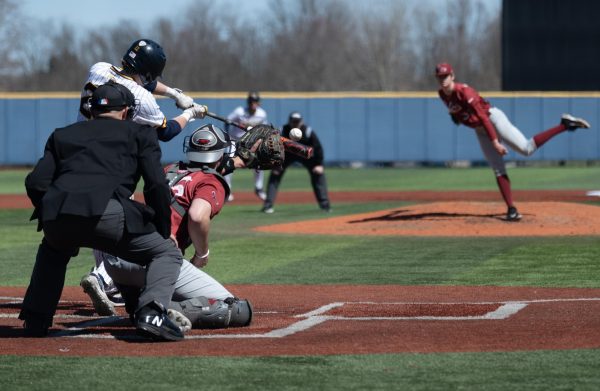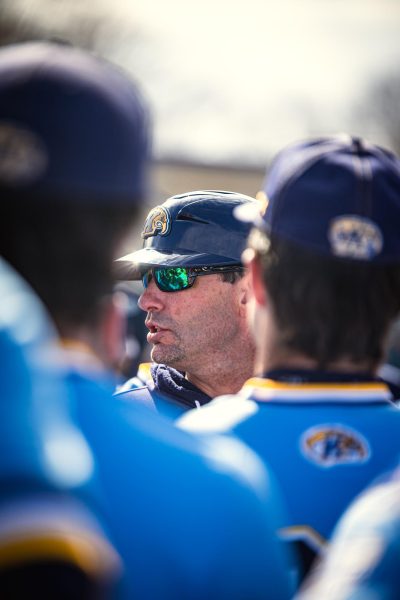Kent State’s first development program for assistant coaches
March 14, 2023
Assistant coaches from nine different Kent State varsity sports participated in the first Coaches Leadership Academy development program.
“This is an opportunity to have something in-house, and it is very unusual to have a program in-house where we can help grow and develop our assistant coaches,” said Amy Densevich, who was the leader of the program. “A lot of times assistant coaches are looking to move on to head coaching roles, so we are helping them prepare for that next step in their career.”
The academy was created as part of Kent State’s “Play as One” campaign.
The mission of the campaign is to have Kent State become a nationally distinct university by “winning championships and graduate student-athletes who are boldly prepared for life after sport.”
The program was on a bi-weekly schedule with six segments over the course of 12 weeks. It took place during the fall semester in preparation for spring sports.
Coaches from softball, men’s and women’s basketball, wrestling, women’s lacrosse, men’s and women’s golf, gymnastics and baseball attended the program.
Fran Recchia, associate head coach of the women’s basketball team, said that attendance in the program was “not required. It was voluntary.”
“There were a lot of little nuggets to take that make us better assistant coaches towards coaches but also prepare us for that next step,” she said. “I thought that this would be a great way to continue my personal development and personal growth.”
The goal of the program was to help assistant coaches develop their skills and become better leaders for student-athletes. The program taught the coaches about the interview process, the psychology of their sports, how to find their strengths and how to improve on their overall weaknesses as coaches, according to Recchia.
“This was designed for the assistants not because they get overlooked,” Dan Mitcheff, assistant coach of the wrestling team said. “It was a way to show that the administration cares for us, and we’re not getting overlooked.”
History of the program
The fall of 2022 was the first time Kent State launched the Coaches Leadership Academy program.
“The support starts from Randale Richmond, our athletic director,” Densevich said. “He’s the one that really wants to see this move forward.”
Richmond is the 12th Kent State athletic director and has been since 2021.
Densevich says Richmond brought the idea of the program with him upon the beginning of his tenure as athletic director. Densevich, the Associate Athletics Director for Academic Services, was selected to lead the program by Richmond.
“I was super excited when Randale proposed the idea to me to kickstart a coaches leadership program,” Densevich said. “ I was in an administrative role, but I am also a former coach. So giving me that opportunity to run a leadership program for coaches, he felt, was well suited for me.”
Densevich also played softball at Kent State and was assistant coach for the team for five years.
She said the program started with “a needs assessment.”
“We held individual interviews with head coaches to find out what the needs are and how we can better support our coaches,” Densevich said. “We talked to assistant coaches and did assessments to find out what their needs were to help them as they grow their brand and as they grow their professional career.”
The lack of opportunities for assistant coaches was a factor in the creation of the program.
“Students have all kinds of opportunities for leadership, whether it’s with our university leadership team or with head coaches, and there are weekly head coaches meetings where they work on collaboration too,” Densevich said. “Right now, the focus, because we just got it off the ground this fall, is assistant coaches.”
Program details
The program had six sessions, and each session had a variety of topics discussed.
“You learned everything from Strength-Finders and emotional intelligence and the hiring process and interview process, and it hit on all the aspects that aren’t necessarily coaching,” Recchia said. “It was everything rounded out to be a better assistant coach, but also how to prepare for the interview process and how to move over.”
Kent State faculty members that led sessions were:
- Dr. Brett Nichols – faculty member in the College of Education, Health and Human services. He led the session on the Social Psychology of Sport
- Ron Smith – Human Resources Senior Training and Development Specialist. He led the session on Strength Based Leadership.
- Dr. Carrie Berta – Assistant Director of KSU Clinical Services with Kelly Tilley – Athletics Embedded Mental Health Provider. They led the session on Mental Health Support.
- Randale Richmond – Athletic Director. He led a session on Professional development as it pertains to career advancement.
“I teach one section, and I really love to have the opportunity to work with the professionals that are here on campus,” Densevich said.
Coaches were also given tests to find their strengths and weaknesses during the program.
“We were given a book on emotional intelligence that also came with an online assessment,” Mitcheff said. “You take it, and it shows you your strengths in certain areas or where you could improve on.”
“A lot of times as assistants or as coaches, you always think about your weaknesses,” Recchia said. “Learning about your strengths and how your strengths can help develop you into a great head coach, as well as using your strengths to be a better assistant coach was really insightful.”
The coaches also described the program as interactive. They mentioned presenters were there to field questions, there was work with other assistant coaches and there were discussions with panel teams, as well.
The coaches also mentioned the importance placed upon the interview and hiring process for assistant coaches looking to become head coaches.
“The leadership panel discussion gave me a lot of takeaways to help improve my resume or just work on certain skills that I could be doing now to help prepare to become a head coach,” Mitcheff said.
Future of the program
Administration is looking to increase funds for the program, as it is funded only by the university.
“From a financial perspective, we’re looking to have support from an endowment,” Densevich said. “Right now, it’s more with our in-house operations.”
The program is set to continue during the spring semester of 2023 with new topics of discussion.
“This spring we’re going to bring in our advancement team because there’s also so much put on the coach’s shoulders as far as fundraising for their programs,” Densevich said. “We are ringing in the advancement team to help them develop their own philosophy for fundraising as they move into a head coaching role.”
Densevich also added the team is “looking to open it up to staff and other coaches and administrators within the department.”
“Everyone should go through some sort of professional development and growth training,” Recchia said. “It’s so good to hear and see different perspectives and if you’re constantly learning and growing, you’re gonna be a better assistant coach.”
John Hilber is a reporter. Contact him at [email protected].























